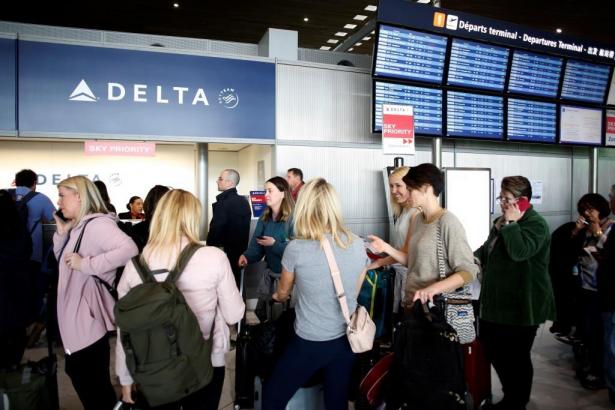For more than a decade, the Association of Flight Attendants (AFA) has struggled to organize flight attendants at Delta, the largest non-union airline in the country. Now, the spread of the coronavirus is giving new energy to what has long seemed an impossible task.
“There has been an uptick in interest in the campaign due to coronavirus. Flight attendants have started comparing other airlines’ responses to safety and employment concerns with our company’s own responses, or lack thereof,” said one flight attendant, “Cheryl,” who recently returned from a country with a major coronavirus outbreak and declined to give her real name out of fear of retaliation.
With over 25,000 flight attendants employed at Delta, a win there would be one of the largest union victories in decades. It would open the door to massive unionizing in the South, where Delta is based, as well as throughout the transportation industry.
The increase in union organizing interest at Delta could also be a sign that, in the age of global pandemics like the coronavirus, more workers will be looking to unions to protect them in scary, turbulent times.
“Calls to sign an authorization card have increased in just a few days. I’ve given out several union pins today alone,” says Cheryl, who added that she has never seen union interest from flight attendants grow so quickly.
Since 2002, AFA has failed in three separate attempts to unionize at Delta. In its most recent effort in 2010, after Delta merged with unionized Northwest Airlines, many pro-union flight attendants were optimistic about victory. However, AFA lost the union election 9,544 to 9,216, a margin of only 328 votes in an election marked by allegations of illegal intimidation. Delta has denied those allegations.
In November of last year, AFA launched a new campaign to unionize Delta flight attendants, hoping that a drive would be successful this time, with union approval at all-time highs.
The union was making steady progress through the winter. However, Delta was able to dissuade some workers by making changes to its policies.
Delta expanded break time between flights and gave workers more flexibility in their assignments. The airline even got rid of the polyester-blend uniforms, which flight attendants had been complaining had been making them sick for more than a year.
However, many flight attendants say that Delta similarly made improvements before the last union election in 2010, only to revert back to old practices once the union threat faded.
Now, with airlines canceling thousands of flights, threats of layoffs looming, and flight attendants forced to work in potentially hazardous situations, union activists at Delta report that they see a massive spike in interest in the union. The coronavirus is serving as a wake-up call to many flight attendants scared about their futures.
“I have not seen interest this high. Not even after the merger with who was already represented by AFA at the time, or during the recession or the Ebola scare of 2014,” says Cheryl, who has worked at the airline for more than a decade. “The threat of involuntary furloughs and layoffs has been a big motivator. We are scared and freaking out because we don’t have any language in our policies for this.”
“Flight attendants are on the front line of this disease, and we don’t have the option of staying home.”
Unlike other airlines, where flight attendants have union contracts, many flight attendants at Delta feel at the mercy of the company.
“Protection is the word on the street I keep hearing. We need protection. We need to protect ourselves. We need a contract for protection,” says Cheryl.
“Someone posted United’s contract language regarding leaves and furloughs in a Facebook group, and many of the responses were flight attendants wishing we had a contract so we could at least stop the speculation and rumors,” she adds. “It would help so much to have even the most basic language covering steps in a crisis like this.”
Despite Delta not having a union yet, the Association of Flight Attendants is already fighting for non-union flight attendants. AFA President Sara Nelson has been all over television, calling on airline companies and federal authorities to protect airline workers.
“Flight attendants are on the front line of this disease, and we don’t have the option of staying home,” Nelson said on MSNBC on Tuesday.
Flight attendants say that high-profile advocacy is making a difference.
“It’s helping a lot to show that, even though we don’t have a union, we can still advocate for changes in the press that affect our lives,” says a flight attendant named “Tom,” who also declined to give his real name out of fear of retaliation.
“We aren’t happy about any of the crises that have happened lately—uniform debacle, coronavirus—but we are going to use every opportunity to organize,” says Cheryl.
The American Prospect strives to be a champion for informed discussion on progressive public policy. Our brand of independent, fact-checked reporting does not come cheap.
When you support the Prospect, your dollars go directly to our mission to cover concentrated corporate power, the financial industry, the labor movement, immigration, infrastructure, foreign policy, the disaster of neoliberalism, the climate crisis, and so much more. If it matters in progressive politics, the Prospect is — and will be — on top of it. But only with your help.


Spread the word